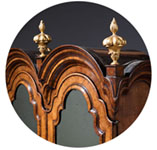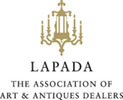17th-Century Floral Marquetry Candle Stand
Circa 1675-1690
SOLD
Request Information
Follow Us
17th-Century Floral Marquetry Candle Stand, Circa 1675-1690
In 2017 the Metropolitan Museum of Art in New York decided to auction a number of pieces of exceptional merit, too include this – IMPORTANT, exceptional, unique and extremely rare marquetry candle stand C.1675-1690.
The octagonal Paduke banded marquetry top depicts an exquisitely executed parrot to the centre, surrounded by fine spring flowers in holly, sycamore and tropical hardwoods. The vibrant green stained leaves of bone bring such vibrancy and colour to the marquetry, a detail most likely adopted from the influx of Huguenot cabinet makers in England, in the 17th century. Supported by a figured walnut six-sided tapering column, terminating on scroll legs of walnut, with original inverted walnut finial. The top is fixed to the base with its original hand-cut wooden screw thread.
Letter as received from seller – “This auction item was purchased February 19th, 2017 from our gallery at 5644 Telegraph Ave, Oakland, CA 94609 as lot 2098 in sale #581. The piece was property from the Metropolitan Museum of Art. The description and provenance details as they were listed in the February catalogue reads as follows “English walnut, ebony, satinwood and ivory occasional table, signed John Watson, circa 1700, having an octagonal top with a floral decorated border centering a parrot, above the turned standard and rising on a later tripod base, with inswept feet, 35″h x 14″dia. Property of the Metropolitan Museum of Art, Sold to Benefit the Acquisitions Fund.”
We did not believe at the time the stand was later and have authenticated the base which is period circa 1700 and original to the top. The accreditation has the backing of our colleague Jim Broughton (Chairman of the British Antique Furniture Restorers Association) and Howard Walwyn (British Antiques Dealers Association member and masterpiece dealer).
The stand has also been exhibited at vetted antiques fair Olympia, in summer 2018.
We stand by our accreditation that the stand is 100% period and original to the top.
The underside is stamped John Watson 8 N…… and we cannot make out the rest. It is most likely that John was not the maker but the once custodian of the object and adjacent is most likely an inventory stamp. There is also 11.175.10 in red, which is the museum inventory number.
Condition
The piece is in exceptional original condition with striking original colour. Minor conservation to preserve.
Provenance
Literature
English Furniture 1660-1714′, by Adam Bowett, page 121-124, 279
A table of the same period and notably similar marquetry – Adam Bowett “English Furniture 1660 -1714” Pl 4-21, which was probably supplied by the London cabinet maker Thomas Pistor to James Grahme, a friend and courtier to James, Duke of York (later James II in 1684).
Dimensions
PREVIOUSLY SOLD
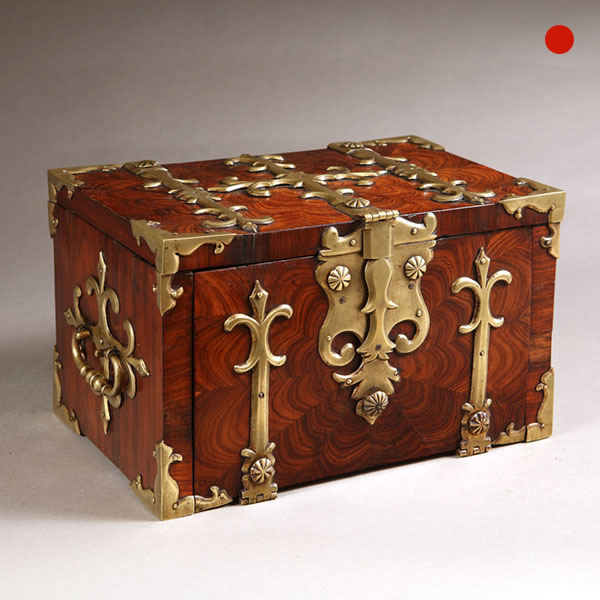
17th Century William and Mary Kingwood Strongbox
A 17th century William and Mary Kingwood strongbox, with gilt brass straps. This strongbox has to be one of the most charming and certainly the smallest example we have encountered, at just 17.5 cm high, 28 cm wide and 18 cm deep. A strongbox of similar merit form and style resides at Burghley House in ‘The 1st George State Room.
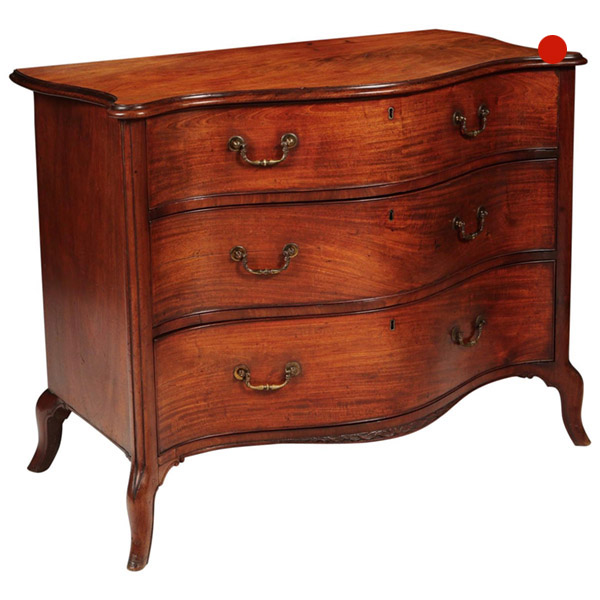
18th Century George III Mahogany Serpentine Chest or Commode
A fine George III mahogany serpentine commode, England, circa 1770. Attributed to Henry Hill, Marlborough. The three graduated drawers retain their original gilt brass handles over a unique carved apron and flanked by moulded angles continuing into the shaped cabriole feet.
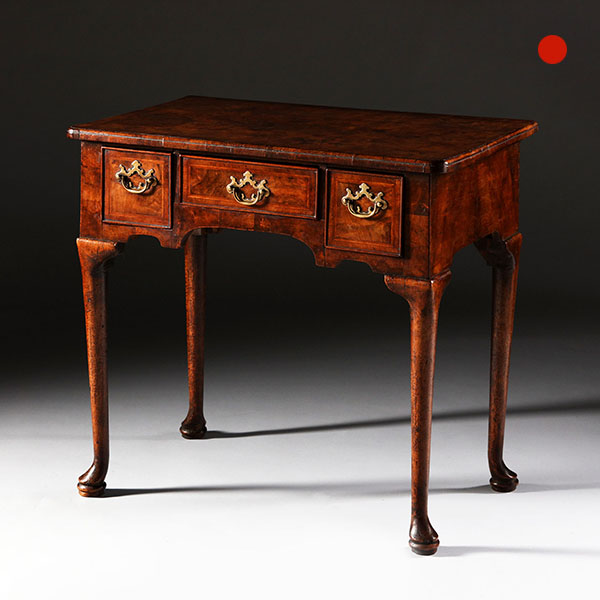
George I Burr and Highly Figured Walnut Lowboy, Circa 1720
George I Burr and Highly Figured Walnut Lowboy Circa 1720. England SOLD Follow UsGeorge I Burr and Highly Figured Walnut Lowboy, Circa 1720. England The feather and cross banded top is quarter veneered with burr walnut and edged with a...
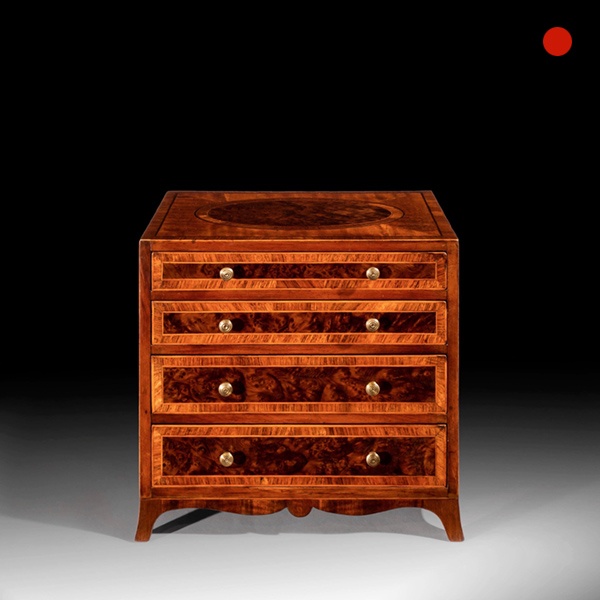
18th-Century George III fitted miniature burr yew and satinwood chest attributed to Ince and Mayhew
A perfectly proportioned miniature chest attributed to Ince and Mayhew. The miniature is of a style that thrived in the latter part of the 18th century, proving popular with nobility and the middle classes. I am not aware of another miniature chest thought to be by eminent makers.
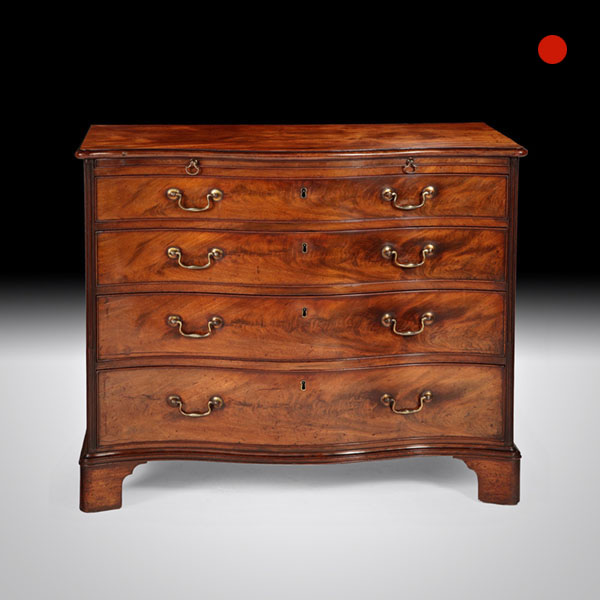
George III Mahogany Serpentine Chest of Drawers
Georgian perfection, 18th century George III mahogany serpentine chest of drawers with brushing slide, fabulous reeded columns and retaining superb original age patinated surface. Choice cuts of flame mahogany veneer sit below the brushing-slide to the four oak lined cock-beaded graduating drawers, which are fitted with their original gilt swan-neck handles, skeleton escutcheons and locks.
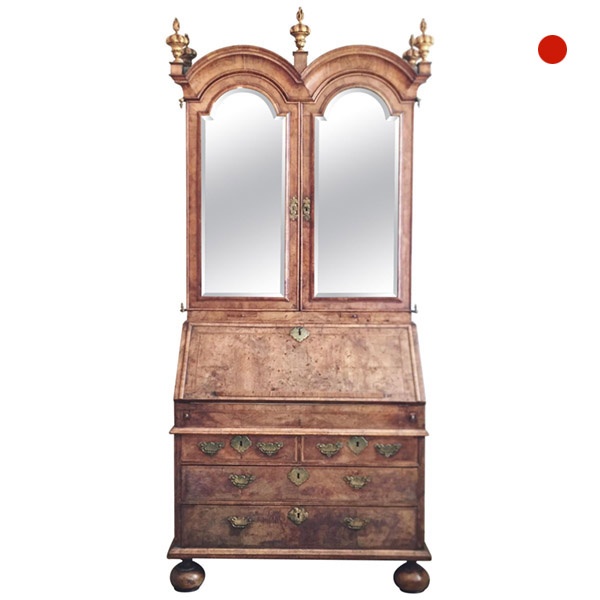
Queen Anne Fully Fitted Figured-Walnut Double Dome Bureau Bookcase
Queen Anne Fully Fitted Figured-Walnut Double Dome Bureau Bookcase 1702 to 1714 England SOLD Follow UsQueen Anne Fully Fitted Figured-Walnut Double Dome Bureau Bookcase A Queen Anne Fully Fitted Figured-Walnut Double Dome Bureau Bookcase,...

17th Century William and Mary Kingwood Strongbox
A 17th century William and Mary Kingwood strongbox, with gilt brass straps. This strongbox has to be one of the most charming and certainly the smallest example we have encountered, at just 17.5 cm high, 28 cm wide and 18 cm deep. A strongbox of similar merit form and style resides at Burghley House in ‘The 1st George State Room.

18th Century George III Mahogany Serpentine Chest or Commode
A fine George III mahogany serpentine commode, England, circa 1770. Attributed to Henry Hill, Marlborough. The three graduated drawers retain their original gilt brass handles over a unique carved apron and flanked by moulded angles continuing into the shaped cabriole feet.

George I Burr and Highly Figured Walnut Lowboy, Circa 1720
George I Burr and Highly Figured Walnut Lowboy Circa 1720. England SOLD Follow UsGeorge I Burr and Highly Figured Walnut Lowboy, Circa 1720. England The feather and cross banded top is quarter veneered with burr walnut and edged with a...

18th-Century George III fitted miniature burr yew and satinwood chest attributed to Ince and Mayhew
A perfectly proportioned miniature chest attributed to Ince and Mayhew. The miniature is of a style that thrived in the latter part of the 18th century, proving popular with nobility and the middle classes. I am not aware of another miniature chest thought to be by eminent makers.

George III Mahogany Serpentine Chest of Drawers
Georgian perfection, 18th century George III mahogany serpentine chest of drawers with brushing slide, fabulous reeded columns and retaining superb original age patinated surface. Choice cuts of flame mahogany veneer sit below the brushing-slide to the four oak lined cock-beaded graduating drawers, which are fitted with their original gilt swan-neck handles, skeleton escutcheons and locks.

Queen Anne Fully Fitted Figured-Walnut Double Dome Bureau Bookcase
Queen Anne Fully Fitted Figured-Walnut Double Dome Bureau Bookcase 1702 to 1714 England SOLD Follow UsQueen Anne Fully Fitted Figured-Walnut Double Dome Bureau Bookcase A Queen Anne Fully Fitted Figured-Walnut Double Dome Bureau Bookcase,...
YOU MAY ALSO LIKE
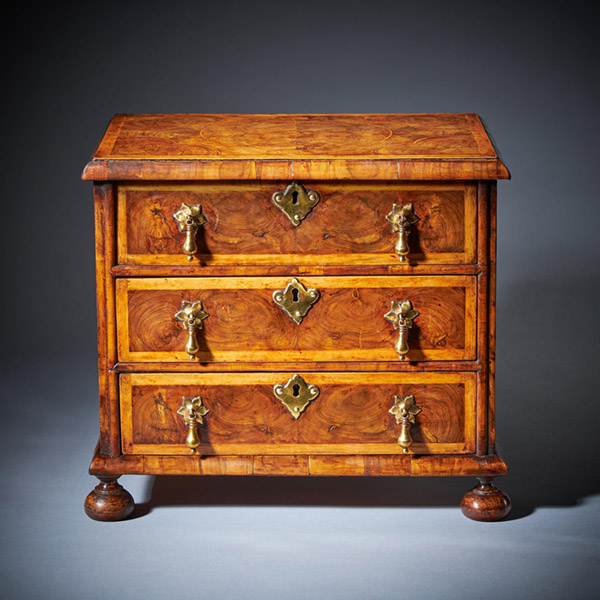
Miniature William and Mary 17th Century Diminutive Olive Oyster Chest C.1690
Miniature William and Mary 17th Century Diminutive Olive Oyster Chest, C.1690 £15,900Follow UsMiniature William and Mary 17th Century Diminutive Olive Oyster Chest, C.1690 A Fine Miniature William and Mary 17th Century Diminutive Olive Oyster...
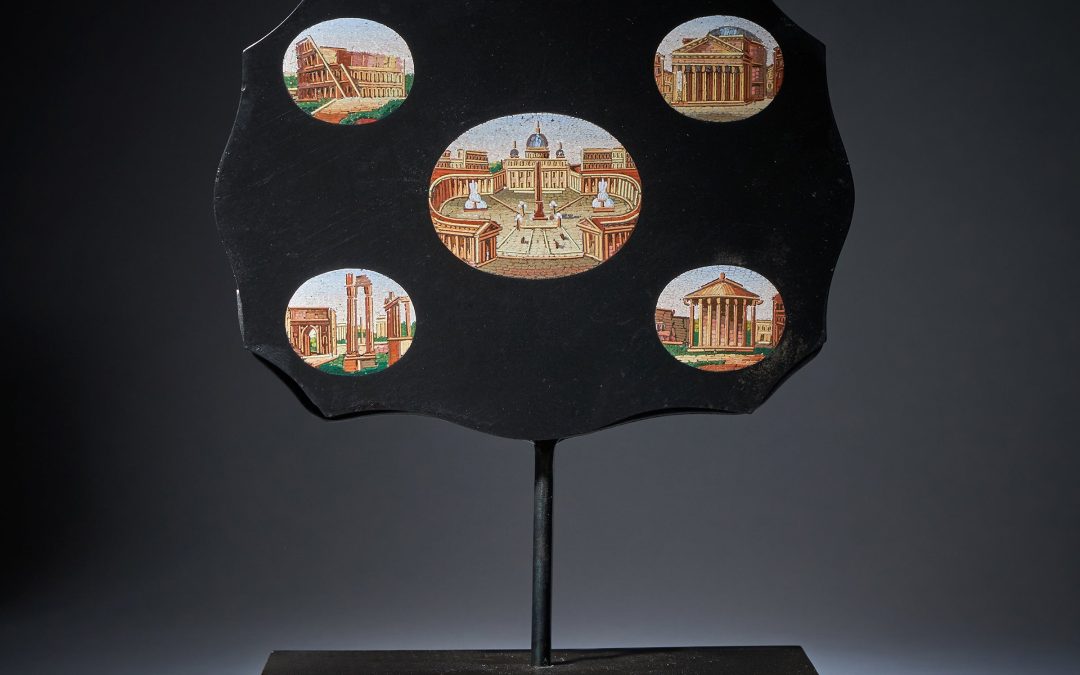
19th Century Grand Tour Micro Mosaic Tablet Depicting Italian Architecture
19th Century Grand Tour Micro Mosaic Tablet Depicting Italian Architecture £3,650Follow Us19th Century Grand Tour Micro Mosaic Tablet Depicting Italian Architecture A fine mid-19th century serpentine grand tour micro mosaic tablet or...
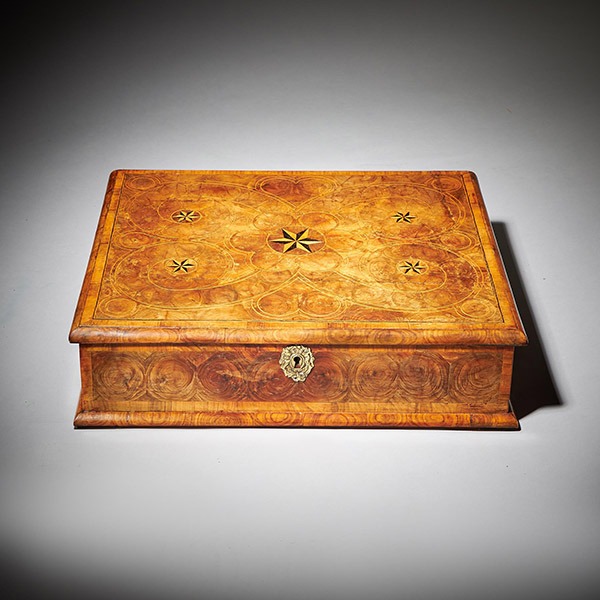
Large William and Mary 17th Century Inlaid Olive Oyster Lace Box, Circa 1690
Large William and Mary 17th Century Inlaid Olive Oyster Lace Box £5,500[wpforms_selector form_id="11387" show_title="on" _builder_version="4.22.1" _module_preset="default" custom_margin="-30px||||false|false" global_colors_info="{}"...
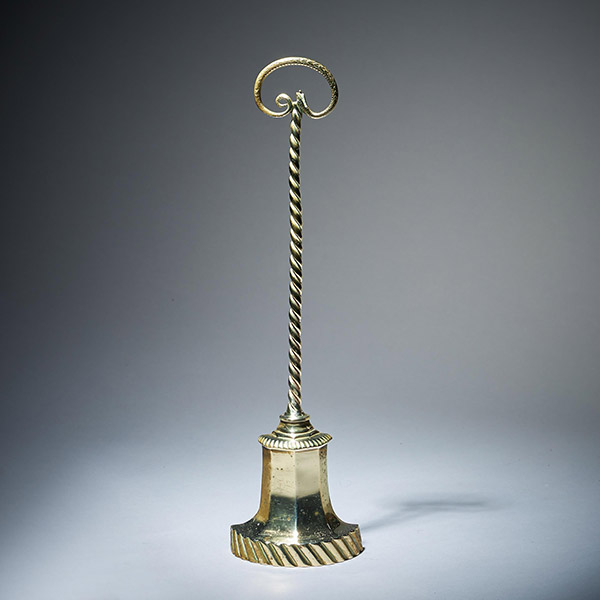
Early 19th Century High Regency Brass Snake Doorstop
Early 19th Century High Regency Brass Snake Doorstop £1,100Follow UsEarly 19th Century High Regency Brass Snake Doorstop A high Regency solid brass bell-shaped doorstop with snake handle, from the reign of George IV, Circa 1770. England The...
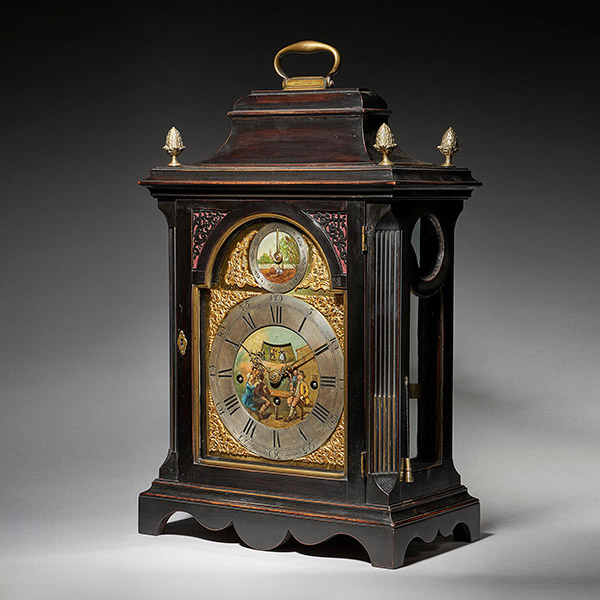
Extremely Rare George III 18th Century Quarter-Striking Bracket Clock, Signed
Extremely Rare George III 18th Century Quarter-Striking Bracket Clock, Signed Follow UsExtremely Rare George III 18th Century Quarter-Striking Bracket Clock, Signed An extremely rare George III 18th century ebonized quarter-striking bracket...
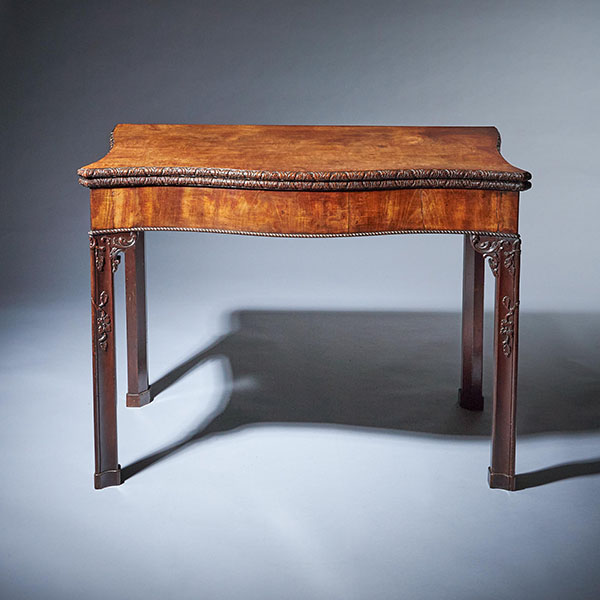
18th Century George III Carved Mahogany Serpentine Concertina Action Card Table
18th Century George III Carved Mahogany Serpentine Concertina Action Card Table £19,800Follow Us18th Century George III Carved Mahogany Serpentine Concertina Action Card Table A bold and impressive George III carved mahogany serpentine...

Miniature William and Mary 17th Century Diminutive Olive Oyster Chest C.1690
Miniature William and Mary 17th Century Diminutive Olive Oyster Chest, C.1690 £15,900Follow UsMiniature William and Mary 17th Century Diminutive Olive Oyster Chest, C.1690 A Fine Miniature William and Mary 17th Century Diminutive Olive Oyster...

19th Century Grand Tour Micro Mosaic Tablet Depicting Italian Architecture
19th Century Grand Tour Micro Mosaic Tablet Depicting Italian Architecture £3,650Follow Us19th Century Grand Tour Micro Mosaic Tablet Depicting Italian Architecture A fine mid-19th century serpentine grand tour micro mosaic tablet or...

Large William and Mary 17th Century Inlaid Olive Oyster Lace Box, Circa 1690
Large William and Mary 17th Century Inlaid Olive Oyster Lace Box £5,500[wpforms_selector form_id="11387" show_title="on" _builder_version="4.22.1" _module_preset="default" custom_margin="-30px||||false|false" global_colors_info="{}"...

Early 19th Century High Regency Brass Snake Doorstop
Early 19th Century High Regency Brass Snake Doorstop £1,100Follow UsEarly 19th Century High Regency Brass Snake Doorstop A high Regency solid brass bell-shaped doorstop with snake handle, from the reign of George IV, Circa 1770. England The...

Extremely Rare George III 18th Century Quarter-Striking Bracket Clock, Signed
Extremely Rare George III 18th Century Quarter-Striking Bracket Clock, Signed Follow UsExtremely Rare George III 18th Century Quarter-Striking Bracket Clock, Signed An extremely rare George III 18th century ebonized quarter-striking bracket...

18th Century George III Carved Mahogany Serpentine Concertina Action Card Table
18th Century George III Carved Mahogany Serpentine Concertina Action Card Table £19,800Follow Us18th Century George III Carved Mahogany Serpentine Concertina Action Card Table A bold and impressive George III carved mahogany serpentine...
